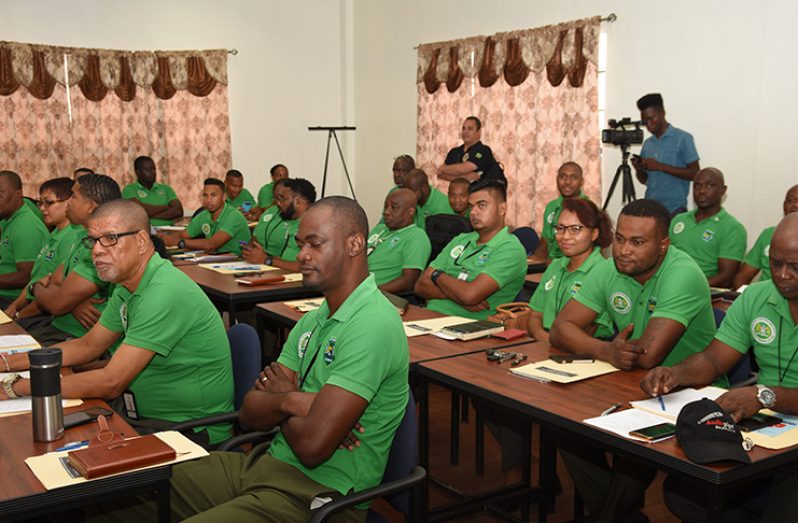POOR and developing countries face the consequences of Trafficking in Persons (TIP) as the uneducated, powerless and poor are faced with physical, sexual, and emotional violence and exploitation at the hands of traffickers.
This is according to Public Security Minister Khemraj Ramjattan who addressed the commencement of a two-day training course for the Corps of Wardens at the Police Training Centre, Camp Street, Georgetown, on Wednesday.
The Corps of Wardens is a law-enforcement unit tasked with the monitoring and enforcement of order in the mining industry. Some 45 wardens were certified last year as supernumerary constables.
“People are trafficked in the millions in the world today and the trade is taking off to the extent of trillions of dollars and poorer and developing countries constitute the bulk from where people are trafficked, because educational levels are low and some are very gullible,” Minister Ramjattan explained.
He said the overall perspective of law enforcement in relation to the natural resource sector and the hinterland was not previously understood in its grand totality, as it was compartmentalised.
He said with enhanced training, the Corps of Wardens will be able to enhance the fight against TIP.
Adding that TIP is modern-day slavery, Minister Ramjattan said it is an extraordinary, brutal crime against humanity, since it exploits persons for sexual purposes, labour and the sale of body parts, among others.
“Innocent people are sometimes knocked in the head and when they are unconscious they are disembowelled just for the kidney, heart and other body parts which are sold for thousands of US dollars to people in wealthy countries that need those parts,” he said.
Underscoring that children are sold much more easily because of the poverty- stricken nature under which they are snatched, Minister Ramjattan said in many cases parents are fooled and duped into propositions that their children will be offered a better life somewhere else and boys and girls are handed over freely.
He said the UN and major world organisations want to see an end to it for obvious reasons, because in a modern and civilised world there must not be any form of slavery.
NO SOFTY, SOFTY APPROACH
“We must criminalise such activity with very serious sentences, ensuring that we have the investigative capacity, ensuring that the people in the country are publicly aware of these kinds of crimes. It is necessary that at the local level, we do what we are doing and enhance the training of those who have the capacity,” he explained.
He explained that human resource development is paramount and the developed countries have reached that stage, because their citizens have the capacity to be multi-disciplinary. As such, that distinguishes the developed from the developing countries.
The Public Security Minister said Guyana’s fight against TIP has seen it maintaining its Tier One status in the US Department of State’s TIP report for 2017.
“These businessmen involved in TIP know their way around, but we have to sharpen up because if we want to have a happier society, we must never compromise the principles and law to the extent that even if the businessman is your partner or your friend, you must speak out against them because these are the little rogue elements in our society that are causing the huge problems we have,” the minister told the gathering.
Meanwhile, Director of Compliance at the Ministry of Natural Resources, Derrick Lawrence, said the role of the Corps of Wardens is too important to be left out in the fight against TIP, since the wardens’ presence in the natural resource sector is too significant not to participate.
He explained that participants will be educated on how they can play their part in the fight against TIP and to assist the many agencies represented on the ministerial task force on trafficking.
“No one person, no one ministry, no one agency can bring about the end of trafficking, but we all must stay committed to fighting the cause while patrolling the natural resources sector,” Lawrence said.
Chief Executive Officer of the Indigenous Peoples’ Commission, Neil Bacchus, said the training course will focus on issues that regard the nature and crime of TIP, functions of the task force, services available locally and how to identify victims and best practices for TIP.
He said persons will also learn how to create a network of information among frontline officers and other stakeholders in different regions of Guyana, who may come into contact with potential cases of TIP, while garnering information to make the task force more effective and efficient in its operations.












